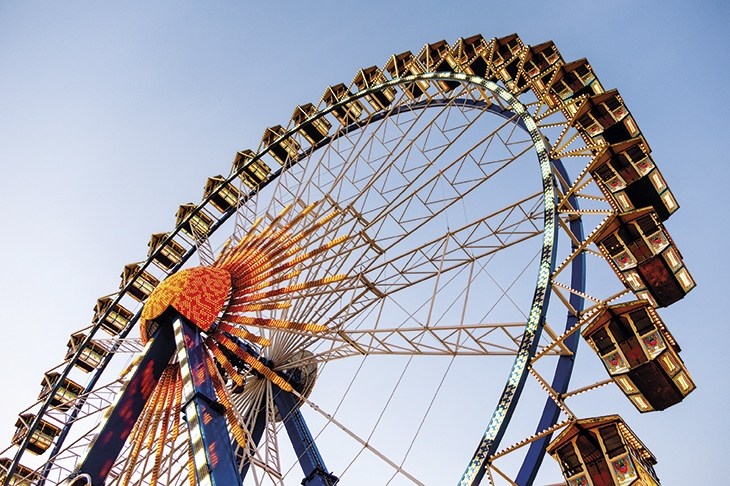August, as usual, will be the busiest month for Britain’s amusement parks — which is odd when you consider that this will mean thousands of people who have been sitting indoors trying to avoid sickness now lining up for seats expressly designed to induce nausea.
There are amusement parks and there are theme parks. The latter often have rides named after movie franchises — or perhaps Peppa Pig — and can charge more for merchandise. Otherwise, the g-force and junk food experiences are similar and there’s one common theme: waiting.
I took my teenage daughter to Surrey’s Thorpe Park shortly after its recent re-opening in the stupid belief that the cap on visitor numbers would easily compensate for socially distanced seating formations. After lining up for 70 minutes for the 15-second, 84 mph experience on Stealth, the UK’s fastest rollercoaster, I offered myself some parental guidance: never again.
The world’s two oldest amusement parks are both in Denmark which, apart from anything else, suggests that we British didn’t invent queuing. Dyrehavsbakken outside Copenhagen opened in 1583. The Tivoli Gardens followed — a little tardily — in 1843. The Isle of Wight’s Blackgang Chine also lays claim to an 1843 origin, but initially offered few amusements, with its centrepiece a whale skeleton (still on show today).
In America, California’s Disneyland is home to the world’s most famous park brand and, somewhat immodestly, dubs itself ‘the happiest place on Earth’. (Florida’s Disney World is merely the planet’s ‘most magical place’.) Disney has exported this happiness to Tokyo, Hong Kong, Shanghai and Paris. The USA boasts five of the world’s ten fastest rollercoasters — Stealth chugs along outside the top ten — but cedes pole position to Abu Dhabi’s Formula Rossa which, for anyone who wants to know why they may subsequently feel a little unwell, reaches 150 mph and 4.8g-force.
One of my earliest childhood embarrassments was my mother’s hysterical screaming that brought an early end to her white-knuckled terror in our gently revolving giant teacup at Battersea Fun Fair. This opened in 1951 for the Festival of Britain and might still exist — it closed in 1974 — were it not for the Big Dipper accident in 1972 which claimed five lives and remains the worst rollercoaster tragedy in history. (The deadliest park disaster was the haunted house fire that killed eight teenagers at Six Flags in New Jersey in 1984.)
Britain’s amusement parks saw revenues top £1 billion last year (2020 will see a significant drop). The most visitors were to Legoland (2.43 million), Alton Towers (2.13m), Thorpe Park (1.9m) and Chessington World of Adventures (1.69m). Alton Towers’ figures have recovered from a 2015 accident on the Smiler ride that caused several injuries.
Personally, I think nothing beats the very British beside-the-seaside views from the top of rides at Blackpool Pleasure Beach, Dreamland Margate and my hometown Southend’s Adventure Island. Each has quaint throwback attractions to complement the modern throw-up ones. Ours include a crooked house and a helter–skelter. My daughter is amused by the former, bemused by the latter — wondering how sitting on a slow-moving coconut mat could ever have sparked an adrenaline rush.
Still, fun for all the family, as they say.






Comments